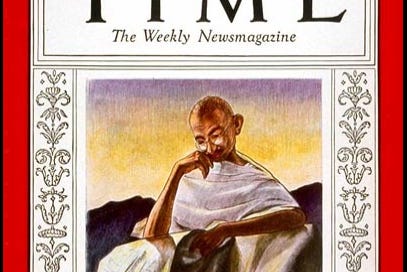On March 2, 1930, a few weeks after declaring a demand for total independence, Gandhi wrote a letter to Lord Irwin, the British viceroy who oversaw India’s administration. Addressing the viceroy as “Dear Friend,” Gandhi announced his upcoming campaign against the British salt monopoly. The Salt March would inspire Time magazine to designate him Man of the Year.
Contrast this to America’s Declaration of Independence. Thomas Jefferson’s document is peppered with words and phrases like “tyrant,” “absolute despotism,” and “injuries and usurpations.” King George III is not a dear friend, but instead the subject of a laundry list of grievances prefixed “He has.” The united states held their “British brethren” to be “enemies in war,” and the first enumerated power for these “free and independent states” was to levy war.
I also wrote about his letter last year, but this year I’m noticing Gandhi’s willingness to make a settlement. Despite the fact the Indian National Congress had just resolved to accept nothing less than full independence, he tells the viceroy to feel “no alarm” about it, if Dominion Status (like Australia and Canada had) was able to be delivered.
Gandhi’s letter did call British rule “a curse” and listed many reasons. The sale of alcohol weighed heaviest on the poor, undermining both “their health and morals.” A multitude of taxes, including that on salt, seemed designed to “crush the very life out of” the population. The costs of the military and civil administration were “ruinously expensive.”
Income inequality was also worth mentioning. Gandhi calculated that the Viceroy’s salary was more than 5,000 times India’s average income. This disparity was far greater than that in England, where the British Prime Minister was “only” getting 90 times Britain’s average income.
Despite this, Gandhi’s tone remained respectful and gentle. “My ambition,” he wrote, “is no less than to convert the British people through nonviolence, and thus make them see the wrong they have done to India. I do not seek to harm your people. I want to serve them even as I want to serve my own.”
This same sentence serves as a pretty good description for the American Union, whose ambition in 2024 is to convert Donald Trump and Joe Biden through nonviolence and an offer to help them accomplish more through cooperation than either could alone. As a nonpartisan PAC, it does not seek to harm any politician or party, but to serve all citizens by building support for ending poverty, mass incarceration, and the endless wars this election year.
Of course, should Congress refuse to be persuaded to serve the people, then duty may require that the American Union of swing voters undertake civil disobedience in the ballot box on November 5, 2024.
More about the Salt March, including the parallels to the American Union campaign, will appear in the coming weeks.
Gandhi’s “unquestioning and immovable faith in the efficacy of nonviolence“ ultimately succeeded. What principle do you have unquestioning faith in?



